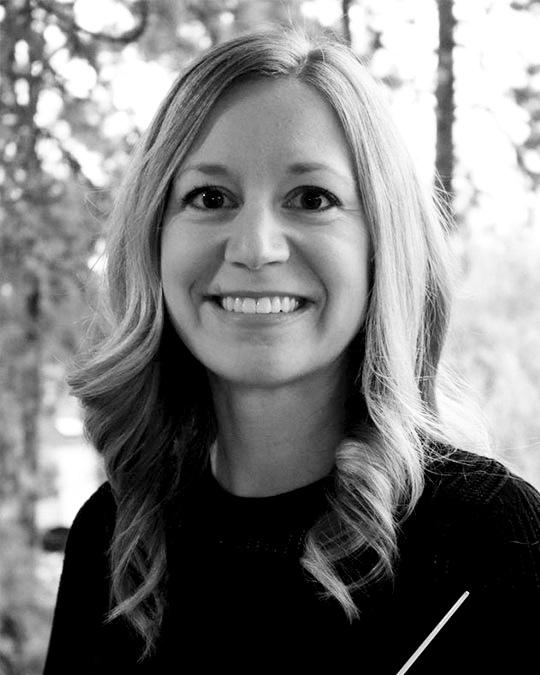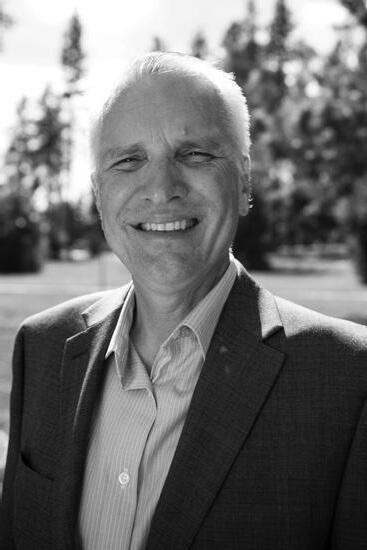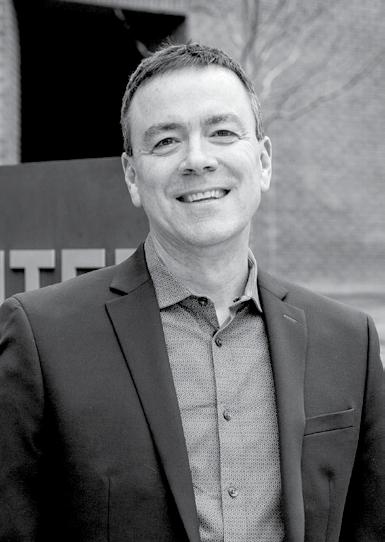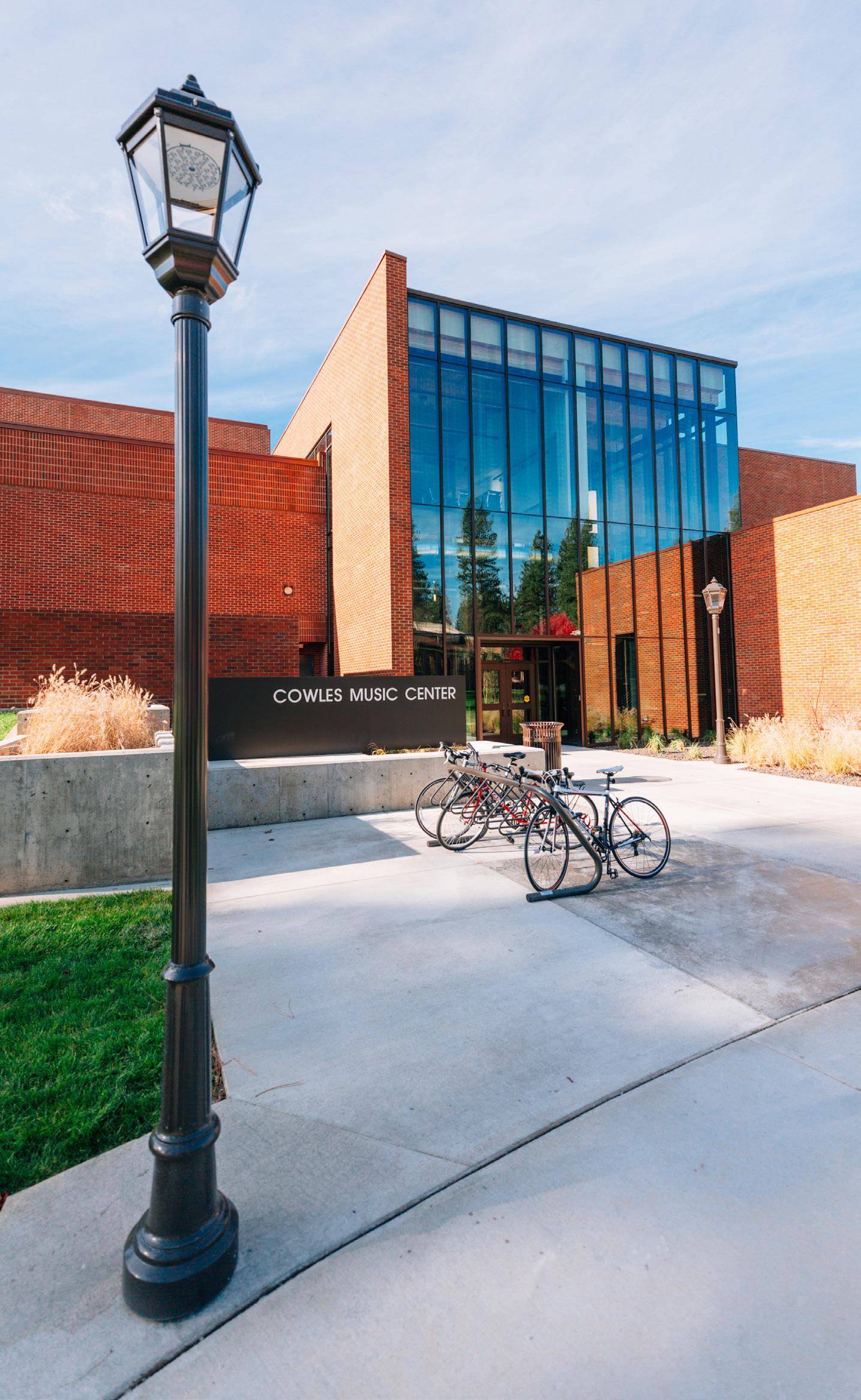WHITWORTH COMMUNITY CHORALE
Scott Davis, conductor
WHITWORTH COMMUNITY CONCERT BAND
Kyla Fague & Richard Strauch, conductors

WHITWORTH COMMUNITY CHORALE
Scott Davis, conductor
WHITWORTH COMMUNITY CONCERT BAND
Kyla Fague & Richard Strauch, conductors

MONDAY, APRIL 14, 2025 | 7:30 p.m.
MARTIN WOLDSON THEATER AT THE FOX
WHITWORTH COMMUNITY CONCERT BAND
Kyla Fague and Richard Strauch, DMA, conductors
Rev Randall D. Standridge (b. 1976)
How Sweet the Sound Brian Balmages (b. 1975)
Dance of the Imp (2020)
Homage to Bharat (Reflections of India)
Justin Botejue ’16, MBA ’22, tanpura and tabla
Hymn of Brotherhood (2007)
The Free Lance March
A Jubilant Song
David Samuel
Brian Balmages
Egbert van Groningen
John Philip Sousa (1854-1932)
WHITWORTH COMMUNITY CHORALE AND CHORAL APPRENTICES
Scott Davis, conductor
Toni Helms, collaborative pianist
Allen Pote (b. 1945)
John Bodinger, organ
Matthew Thornell ’26, Trevor Rees (Whitworth Community Concert Band), trumpet
Jay Weidemann ’23, Angelina Burgard ’09 (Whitworth Community Concert Band), trombone
Alexis Asato ’25, Max Bartron ’27, Ella Davis ’26, Madeline Davis ’27, Nevaeh Gariepy ’25, Julia Maher ’26, Michael Perry ’27, bells
I Am In Need of Music
David L. Brunner (b. 1953)
The Earth Adorned Waldemar Åhlén (1894-1982)
Mackenzie O’Donnell, solo
For the Beauty of the Earth John Rutter (b. 1945)
Animal Crackers, Vol. 1
Eric Whitacre (b. 1970) Poetry of Ogden Nash (1902-71)
I. The Panther
II. The Cow
III. The Firefly
Rise Up, My Love, My Fair One James McCray (1938-2018) Song of Solomon 2:10-12
Erin Rose Medina ’04 (Whitworth Community Concert Band), flute
I Love My Love David Dickau (b. 1953)
Anthony Bithell ’21 (Whitworth Community Concert Band), clarinet
Hard Times Come Again No More Stephen Foster (1826-64) arr. Mark Keller (b. 1955)
Gideon Booz, solo
“It Might As Well Be Spring,” from State Fair Richard Rodgers (1902-79) & Oscar Hammerstein II (1895-1960), arr. John Purifoy
“Oh, What A Beautiful Mornin’,” from Oklahoma! Richard Rodgers (1902-79) & Oscar Hammerstein II (1895-1960), arr. Red & Joubert
Caleb Krantz, solo
Jubilate Deo Peter Anglea (b. 1988)
Psalm 100:1-2, 5
With A Voice of Singing Martin Shaw (1875-1958)
John Bodinger, organ
The Road Home Stephen Paulus (1949-2014)
Emily Weiler, solo
Music Inspires All Rollo Dilworth (b. 1970)
This piece was commissioned by Jason Nitsch and the Heritage High School Band. One word comes to mind for Imp – mischief. This piece depicts just that with a mysterious, yet playful theme. Imagine a playful Imp dancing around a fire on a lonely starry night… planning up some quirky scheme. The piece opens us with minor triads in the trombones, and the melody is introduced in the clarinets. The full band depicts the Imp at work as the flute, clarinet and trumpets push the theme to new developments, while the saxophones, euphonium and xylophone play descending and ascending counter-melodic figures. Afterwards, the piece depicts the Imp with playful-like figures as the woodwinds carry the theme while the trumpet and euphonium enhance the melody. The piece then moves to major, but quickly moves back to minor. Once again, the Imp’s work is always uncertain. I hope you enjoy Dance of the Imp, and hopefully you will leave pondering what will happen next. – David Samuel
Inspired by Bollywood music, Homage to Bharat is derived from a fusion of Indian classical and pop music with Western influences. The name Bharat is the Sanskrit name for the Asian subcontinent that is now known as India. The strong connection to India reflects the large Indian population of the commissioning school in Plano, Texas.
In researching and listening to Bollywood music, one of the composers who struck me was A.R. Rahman. His ability to integrate traditional Indian music with electronics and orchestra is incredibly unique, resulting in several Academy Awards, Grammy Awards and more. My goal was to try and realize something similar within a concert band framework. The opening of the work makes use of a tambura, an Indian drone instrument. It looks like a sitar but does not change pitch while being played. The strings are tuned ahead of time to create the drone. Eventually, the drone is lost as the music around it builds and becomes the focus. Throughout this section we hear a contrast between consonance and mild dissonance (typically created when a note does not resolve for a while and leaves a trail of the old harmony into the new one). The primary theme is introduced at measure 23 (trumpet 2), as is one of the primary rhythmic elements of the work (triplets).
The entire middle section is based on creating, developing and layering various grooves, very similar to some of the Bollywood-style music that I studied. Early on in this section, the brass take on the characteristic drone qualities of the tambura. As this section moves through various rhythmic grooves and layered musical lines, it eventually gives way to a light-hearted presentation of the primary theme. The music then begins a final groove with multiple lines layered on before all the existing themes are juxtaposed while maneuvering through atypical meter changes.
The final section/coda of the work represents a return to the opening, with the use of similar instruments (tambura, flute and various percussion). However, in this final section, new instruments quietly present short phrases derived from throughout the work. A haunting chorale continues to build, yet never fully resolves until reaching the most powerful moment of the piece. At this point, the music moves in and out of phase (harmonically, it resolves and then moves immediately back over and over).
Homage to Bharat was commissioned by the Rice Middle School Wind Ensemble in Plano, Texas (and was published in 2018). In the process of commissioning me, they let me know of the large Indian population of their school. I thank them for the incredible challenge this piece presented, and for giving me a chance to go outside the box. I am thrilled with the result! – Brian Balmages
Egbert van Groningen is a Dutch trombonist, composer and conductor. Groningen composed Hymn of Brotherhood in 2007 for the B-Orchestra of Harmonie Sint-Jan in Wierden. The composer writes that in this beautiful work, charity (Noaberschap) is of paramount importance. The work exudes respect, appreciation and dedication. The composer notes that in our current, increasingly individualized society, Hymn of Brotherhood serves as a beautiful, reflective, meditative moment.
Written for the memory of his college mentor, Mr. Brunner writes: “The [composing process] started – and stopped – many times. In the end, I wrote music that is reflective, lush and lyrical, with the text always foremost. I have been attracted to Elizabeth Bishop’s Sonnet for some time. It is one of those poems that seems to sing itself off the page. The phrases… are intimate and comforting in their own rhythm.”
This melody was composed in 1675 and included in an early hymnal in 1921. A favorite folk song in Sweden, this simple song is a hymn of praise to the rich greenness of summer, a short-lived season in Sweden. The choral arrangement is from 1933.
I’ve always dreamed of writing a substantial collection of choral works that might enter the standard choral repertoire, something with the depth and passion of Monteerdi’s Fourth Book of Mardigals and the charm and timelessness of Brahms’ Liebeslieder Waltzes. I wrote this instead… Ogden Nash wrote scores of these ridiculous animal poems, all of them crying out for musical settings. – Eric Whitacre
There are many choral settings of this famous biblical text, my other favorite being composed by Healy Willan, which was sung at Stacy’s and my wedding. But this setting by James McCray is set in a 6/8 lilt and, when accompanied by flute, portrays perfectly the unbounded joy and innocence of love possible in a marriage relationship, while simultaneously communicating God’s perfect lovingkindness for creation.
David Dickau wrote this in honor of friends’ 30th wedding anniversary. He writes, “The Samuel Taylor Coleridge text was chosen by the couple along with the instrumentation… Throughout the piece the clarinet simulates various bird calls in relation to the text. The mood of the music changes throughout according to the season, especially with the return of spring and summer. The title of the poem is Answer To A Child’s Question. Dr. Dickau is the longtime director of choral activities at Minnesota State University, Mankato, and has recently retired to Boise, Idaho.
Stephen Foster wrote My Old Kentucky Home, Camptown Races, and 200 other songs and hymns. He has become a controversial figure among musicologists today due to many of his lyrics depicting life in the South in the 1800s, while it is said that he only visited the Southern United States once in his life. Hard Times, however, suggests that we stop and ponder the tears of life’s tragedies and labors, personified in the line “many days you have lingered around my cabin door, Oh! Hard times come again no more.” This short tune conveys tenacity in life’s difficulties that defies defeat.
Winning the Oscar for Best Original Song in 1945, this tune is sung by Margy near the very beginning of both the film and stage productions. Here, we are using this song as a simple celebration of renewed life that comes at the end of winter. But originally, for the stage, Margy sings “in a melancholy way” who knows “I’m a dope.” She’s in a romantic state of confusion, setting up a plot for later in the story.
Everyone from Spokane’s Bing Crosby, to Ray Charles, and James Taylor have since recorded 1943’s most famous song, originally sung on Broadway by Alfred Drake. Hugh Jackman again made the song famous when he played Curly in 2003. We love this song for its unapologetic optimism, the arrangement’s lush harmonies, unpredictable key changes and the full chorus power of the 1955 film adaptation of Oklahoma!
Jubilate Deo
This song, the only one in tonight’s concert in Latin, was dedicated to Rivertree Singers of Greenville, S.C., for the ACDA Southern Division convention in 2014. The beloved text is from Psalm 100:1-2 and 5: “Make a joyful noise unto the Lord, all ye lands. Serve the Lord with gladness: come before his presence with singing. For the Lord is good; his mercy is everlasting; and his truth endures to all generations.”
“I decided upon an asymmetrical meter (10/8) for this piece because it brings energy and exuberance to the music and because it fits the declamation of the text perfectly. The form is a modified rondo in which the recurring theme is the one set in 10/8. The rest of the piece bounces between differing meters – 6/8, 3/4, 4/4 and even 8/8. The layering of different rhythms on top of each other helps build the momentum and excitement throughout.” – Peter Anglea
One of America’s preeminent composers, Stephen Paulus wrote 12 operas, 55 orchestral works and over 400 chorus works, with over 600 total works to his credit. His website biography states he was nominated for several Grammy awards, winning posthumously in 2016. He died in 2014. The Road Home was commissioned for Minnesota’s Dale Warland Singers, and Paulus’ relationship with the state remained very special to him all his life. We love this arrangement of a classic Southern melody for its simplicity, transparency and gentle encouragement when the soloist sings, “Rise up, follow me… with love in your heart as the only song!”
PICCOLO
Tanner Stansbury ’16
FLUTE
Payten Weisenhaus ’22
Erin Rose Medina ’04
Shay Perlot ’26
Abby Sanders ’25
Jaxson Thomas
Robin Johnson
Megan Goodale ’16
Heaven McIntyre ’26
James Fischer ’28
Mary Joan Healy-Hartill
OBOE
Alisa Peterson ’16
Hannah Hart
BASSOON
Tristan Koop ’26
Cadence Roling ’26
CLARINET
Anthony Bithell ’21
Collin Iedema ’21
Allie Vu ’23
Henry Johnson ’24
Chris Gibbons
Mikayla Goodsell
Raeanna Hayford ’28
Andrew Bouma ’28
Harmony Pakootas ’28
BASS CLARINET
Callan Hosmer ’17
ALTO SAX
Jonathan Morris ’28
Tina Michael
Alden Sauvageau
Erin VanDerWerff
BARI SAX
Jonas Stachowiak ’28
TRUMPET
Matthew Thornell ’26
Trevor Rees
Nicholas Horner ’26
Trevor Bradley
Emma Williamson ’28
Archimedes Helm ’28
Revelle Mors
FRENCH HORN
Nathan Miles
Tylar Sewell
Collin Baker
Sam Hershberger ’28
TROMBONE
Jay Weidemann ’23
Angelina Burgard ’09
George Spencer ’28
Evan Mori ’28
EUPHONIUM
Brandon Campbell ’13
Bernard Sheldon
TUBA
Jerry Olson
Ivan Erland ’28
PERCUSSION
Rachel Werner ’19
Rebecca Forbes
Rachel Barnett
Andrew Wiebers ’21, MIT ’22
Michael Holland
*Whitworth Choral Apprentice
SOPRANO
Tammie Athena
*Anne Bodinger
Nicole Bouchard
Sydne Burgess ’15
Marie Curtis ’22
Karen Keith
Beth Meersman
Sarah Merfield ’26
Betsey Moe ’95
Sarah Mott ’26
Corliss Newman
Mackenzie O’Donnell
Kathy Olson
Michelle Reid
Mari Sue Romero
Stacey Smith
Linda Sorge ’80
Sally Strauch MIT ’99
Hannah Warnecke
Emily Weiler
MEZZO SOPRANO
Barbara Allen
Julie Boehr
*Samantha Empert
Carina Engelhard
Julia Fehr ’25
Melissa Halverson ’25
Claudie Hartanov
Stephanie Ingoldby
Katherine Karr-Cornejo
Camilla Mounts
Tracy Mouser
Titilope Olatunji ’26
Kathleen Potter
Lily Reavis ’25
Kylee Russell ’26
Alison Russo
Renee’ Schoening
Kaila Shumaker ’21
Olivia Stallcop
Katy Vancil ’26
Anne Wilcox
Pamela Barnes
Kristine Binnie
Kari Bonagofski
Sharon Bouten
Ivanna Boyd
Suzanne Capstick
Cynthia Curran ’21
Taylor Deitz
Sylvia Dilworth
Rachel DuPont ’97
Sue Frankovich
Kari Gilbert
Catherine Grady
Kristiana Holmes
Wendy Holmes
Carol Horlacher
Judy James
Krista Jennings
Amy Johnson-Colwell
Laurie Klein
Hunter Koss ’26
Ayisha Lawrence ’20, MBA ’23
Loy Liezen
Emma Mangum ’26
Karen Meyers
Alane Michels
Shari Miles
Diane Minezero ’28
Adel Nemes-Thompson
Frani Olson
Wendy Olson
Paula Park
Lucy Pearson
Morgan Perron ’28
Sheryl Piskel
Emma Scott ’24
Nicole Sheets
Linda Storey
Addelyne Stouder
*Shelby Tomlanovich
Dana Tolley ’09
Anikke Trier
Hanna Vermeer ’27
Gia Warren ’27
Marta Williamson
Melanie Williamson
John Bodinger
Bret Booz
Jim Brandon ’28
Caleb Krantz
Eric Moe ’95
Zeke O’Donnell ’27
Robert Olson
Ted Trigg
David Whisenand ’23
Vicki Wieber
*Gideon Booz
Hank Broeckling
Lance Coppo ’28
Jim Crouch
Stacy Evans
Kyle Gilbert ’27
*Christopher Heath
James Hillbrick
Tim Jennings
*Levi Jennings
Bill Klein
Zach Marble
Randy Olson
Markus Ong
Grant Sorge
Will Strauch ’27
David Vermeer
Stephen Wieber

Kyla Fague graduated from Whitworth in 2001 with a degree in music education and received her master’s degree in conducting from the American Band College at Southern Oregon University. While at Whitworth, she was awarded the Anna J. Carrel Outstanding Senior in Music Award and was a member of the wind symphony and jazz ensemble I, playing saxophone as well as studying piano. Fague taught high school band and math for four years in her hometown of Fairbanks, Alaska. At the 2005 Alaska Jazz Festival, she received the Most Distinguished Director Award. After returning to Spokane, Fague taught band at Medical Lake High School and Medical Lake Middle School. She currently directs Jazz Band II at Gonzaga University, Jazz Band II at Ferris High School and the Chancel Choir at Hamblen Park Presbyterian Church. She has been directing the Whitworth Concert Band since 2006. Fague loves spending time in the beautiful outdoors of the Pacific Northwest with her husband and three kids.

Richard Strauch is in his 28th year as director of the Whitworth Wind Symphony and professor of music at Whitworth University. He also conducts the Whitworth Chamber Winds, teaches courses in music history and conducting, and leads Whitworth’s Power & Politics of Art: Rome/ Florence/Vienna/Berlin study program. Prior to joining the Whitworth music faculty, Strauch served as director of instrumental activities at Phillips University, acting director of the Wheaton College Wind Ensemble and assistant to the director of bands at Yale University. He has toured Europe as music director of the Oklahoma Ambassadors of Music and as conductor of the Fox Valley Youth Orchestra. An active professional trombonist, he is a member of the Spokane Symphony Orchestra, and his other performance credits include the Clarion Brass Choir, the Norfolk Chamber Music Festival, the National Orchestral Institute and the Civic Orchestra of Chicago. Strauch holds doctor of musical arts, master of musical arts and master of music degrees in trombone performance from Yale University, and a bachelor of music degree in trombone performance and music history from the Wheaton College Conservatory of Music.

Teaching for 31 years at Clackamas High School, Scott Davis was also the inaugural choir teacher at Adrienne C. Nelson High School, a new high school that split from Clackamas High School in September 2021. For over three decades, Davis conducted the Clackamas choral program of five choirs, including the 75-voice, varsity A-Choir. The A-Choir toured twice to Carnegie Hall performing a program of Aaron Copland and later of Magnificat in D Major by J.S. Bach under the direction of Randi Von Ellefson.
All choral students completed nine months of music theory training and studied sight-reading every year. Since being at Clackamas, Davis designed and instituted units in beginning conducting and rehearsal technique for his most advanced students. Music theory, sight reading and ear training were integrated into choral curricula. He has also team-taught musical theatre and theatre management and conducted 19 musical productions at Clackamas, Nelson and Jesuit high schools. In fall 2009, he designed a challenging beginning guitar curriculum utilizing both Spanish (classical) and folk styles. In 1990, he was one of six Americans invited to sing with the World Youth Choir in Belgium and throughout Western Europe under the batons of Ward Swingle, Frieder Bernius and Robert Shaw. He earned a B.A. in music with emphases in vocal performance and church music and a B.A. in arts administration from Whitworth College (University) in 1991, and earned a master in teaching in 1993. Davis was the secretary of the Oregon Board of ACDA from 1994-2004 and was the Honor Choir chair for the 1998 Northwest Division ACDA Convention in Portland. He also chaired the Treble Honor Choir for the 2007 NW NAfME Convention, also in Portland. In June 2010, he was awarded Clackamas’ Golden Apple Award, given to faculty members who have had a significant impact on the lives of students. In November 2010, he received radio station K103’s Teacher of the Week and was interviewed during a morning broadcast and featured on K103’s website. An endowed scholarship at Whitworth University, the Scott W. Davis Music Scholarship, was set up by a generous Clackamas family in 2016. Davis was nominated for Oregon Teacher of the Year in 2024. Davis has co-developed an online music theory assessment method so music teachers can have access to a precise data pool generated in their own classroom as a result of their own instruction. The method’s goal is to assist teachers in becoming better practitioners of music instruction. Davis was a Covenant Church worship pastor for nine years in northwest Portland. In prior years he served as chapel choir director at Whitworth and as a central city church choir director, both in Spokane. Recently he served as worship leader and, along with his wife, Stacy, as marriage mentors at Good Shepherd Community Church in Boring, Ore. He enjoys hiking, camping, mountain biking, caving, playing guitar, reading and the company of his wife, Stacy. They have two delightful daughters and now live in Colbert, Wash.
The Whitworth community ensembles are adult, non-auditioned, open-enrollment ensembles specifically for community musicians college-aged and above, as well as Whitworth students, faculty and staff. The community concert band performs a mix of traditional and contemporary music (concert works, marches, medleys, etc.) for winds, brass and percussion. The community chorale is dedicated to the performance of large-scale choral masterworks in addition to secular and sacred choral works. The Whitworth community ensembles rehearse on Monday evenings during the Whitworth University academic calendar from 6:308:30 p.m. The ensembles present two concerts each academic year, one per semester. You can register for the fall semester by visiting whitworth.edu/community-ensembles or by scanning the following QR code.
Program cover design and original art by Whitworth Community Concert Band member Abby Sanders ’25.
The Whitworth University Music Department, accredited by the National Association of Schools of Music, provides superb training in music as well as a thorough introduction to this essential element of the liberal arts. Whitworth music majors have gone on to prestigious graduate schools, fulfilling performance careers and successful teaching positions. Also, many non-music majors participate in the university’s renowned touring ensembles and enroll in private lessons through the music department. Whitworth University offers bachelor of arts degrees in music ministry, composition, instrumental performance, jazz performance, piano performance, piano pedagogy, vocal performance and music education. Music scholarships are available to both music majors and non-majors. For more information about the music program or scholarship auditions, please contact us:
Music Department
Whitworth University Spokane, WA 99251
509.777.3280 | whitworth.edu/music
facebook.com/whitworthmusic
instagram.com/whitworthmusic
youtube.com/whitworthuniversitymusicdepartment
